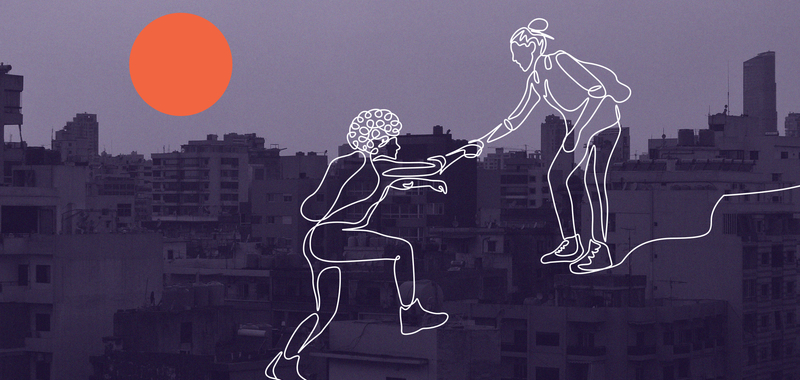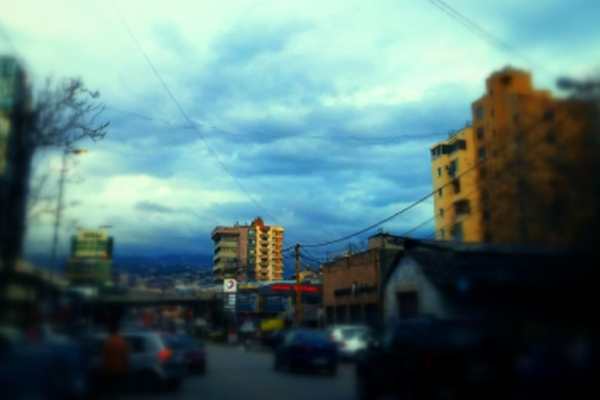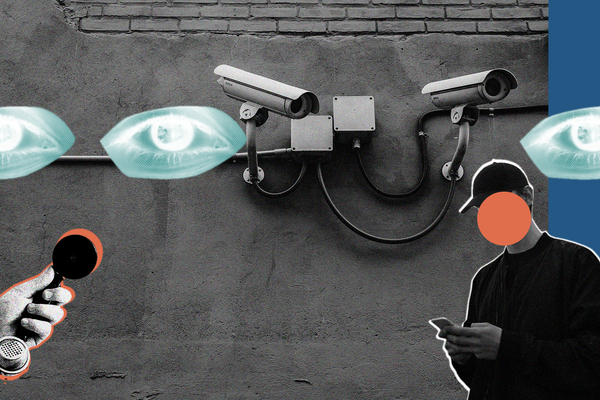*We are living in times of collapse. We are living in the time of monsters. Four years into an ever-worsening economic crisis in Lebanon, a new social order appears to be forming. Sectarian vigilantism, reminiscent of the civil war era, is returning. In recouping patriarchal power in their respective neighbourhoods, and incited by state officials, sectarian forces are mobilizing against queer folk, women, and Syrian refugees. Any hopes of political intervention are moot, since these same forces are sponsored and supported by the sectarian elite and, ultimately, the state. Lebanon is becoming a terrifying microcosm of the brutality and ugliness of capitalist collapse; a paradigm which can be seen the world over.
We lack any real political alternatives that can counter both the rise of oppression and the total economic collapse that oversees it all. All the old methods for progress have failed: electoral politics has provided nothing; the dominant NGO structures are largely impotent if not harmful; any revolutionary impetus of the October 17 uprisings has failed to materialize. Through long processes of capitalist exploitation, colonial ruptures and erasures, and sectarian violence, we in Lebanon have been stripped of the histories and communal practices that could serve as guidance in these volatile and precarious times.
Everything we mentioned is even more dire for working class queer communities in Lebanon. Not only are queer people facing the brunt of this sectarian patriarchal violence, they have also been some of the most affected by the economic collapse. There is some documentation of the increased levels of physical and psychological violence, but few figures illuminate the levels of economic violence queer people in Lebanon are facing - due to lack of documentation but also to the invisibilized nature of such types of violence. This begs the question, how can we - as organizers, leftists, queer folk, etc. - respond to these compounding crises? What can we do to meaningfully resist the violence coming from multiple directions? Acknowledging the need for new political and economic practices, what tools do we have to begin implementing them? Through our own experience as members of Queer Mutual Aid Lebanon, as well as complementary research, this essay will explore these questions further.
We of course do not have definitive answers, which is part of the problem described as a “crisis of imagination”. However, we are well-placed to examine the role of community care practices that can a) be mobilized with direct effects for community survival and b) potentially serve as tools to further explore new modes of resistance.
Local Forms of Solidarity
One reason the practice of Mutual Aid is sometimes difficult to describe is that it exists so pervasively in basically every human society. Peter Kropotkin, the Russian anarchist philosopher who popularized the term, focused on how those impulses for mutual support and cooperation were fundamental factors in our evolution. These impulses are brought to new levels in situations of crises and collapse. Focusing on our region, we saw the necessity and strength of mutual aid practices in the local councils in Syria, which kept populations alive and resisting during periods of siege; the resistance committees in Sudan, who provided aid to their local communities and integrating revolutionary ideas into everyday life, to name a few.
In the midst of our own multi-layered crisis and acknowledging the failure of old methods of community support, communities in Lebanon need to learn from these experiences and also from our own erased practices of mutual aid. Since our emphasis is on working within our community, one thing we have definitely come across is confusion with the term itself. Even though its practice is ancient, and its forms are quite prevalent in Lebanon - village life, family solidarity, communal practices - the term isn’t. Its translation in Arabic is a clunky phrase most haven't heard of, although its principles relate to the concept of “solidarity cooperatives”. We use the phrase of mutual aid but in many ways we are trying to find the local corollaries to it. We think this is vital because, aside from the direct work we do, one of our main goals is to develop and spread ideas and models of community support that are integral parts of political organizing and society more generally (although they are often neglected and erased). This is one of the main reasons that led us to adopt the name, practice, and concept of mutual aid.
Queer Mutual Aid (QMA) formed in June 2020. Ten months after the start of the October 17 uprisings, and three months into the COVID-19 pandemic, the necessity to create a community-based solidarity network became clear as day. It started with three people, all queer activists in Lebanon who had been politically active even before the uprising. Alienated by the inadequate (and often harmful) mode of political organizing of non-governmental organizations (NGOs), discussions began to form around new alternative modes. The goal was to create a group that embodied, both in theory and praxis, principles of both anti-patriarchy and anti-capitalism. In this text, we want to explore the nuances, experiences, and lessons learnt from our own experience working on community support in Lebanon.
The Radical Pedagogy of Mutual Aid
Creating a solidarity network which provides support for queer people, without falling into NGO-ized, hierarchical structures of political organizing, is of the utmost importance to all of us. However, there is no guide book for how this can be done, let alone for the queer community in Lebanon. This knowledge had to be produced. To this end, Queer Mutual Aid Lebanon became a site for development, a laboratory to experiment with and explore new tools, new modes of organizing, and new models of aid that are opposed to charity or NGO models.
Our opposition to NGO structures, which many have called the NGO Industrial Complex, is not simply ideological, but rather arises from our personal experience within them, our joint analysis of their complicit role within capitalism and imperialism, and ultimately, in regards to our specific work, from complaints of mistreatment and neglect by members of queer communities. The analytic critique is valuable but what is more important for us is how to allow our work and structure to reflect the lessons learnt from those critiques.
Although there are variations, the organizational structure of NGOs in Lebanon mimics the hierarchies of private companies. There is little room for autonomy, democracy, or plurality in many cases, contrary to the values they claim to advocate for in the wider society. Yet, for us QMA Lebanon, we view the processes of collectively meeting, networking, pooling resources, and imagining, as not only a “means to an end” but an end in itself. Thinking of organizing in this way has allowed us to develop more fluid structures based on horizontal decision making and consensus. These are models and forms that we believe should be popularized and used by other activist groups in order for them to embody the principles that they preach.
To this end as well, we insist on perpetuating a culture of de-professionalizing aid and community work. We are all volunteers and recognize the moral, political, and tactical hindrance of attaching salaries to this type of political work. For one, professionalized aid work creates hierarchies and asymmetries within the very community the NGOs are claiming to serve. There is a blatant hypocrisy, for instance, when a working class trans woman approaches us to cover the cost of food or rent, when there exists an abundance of funds for NGO workers, whose very mandate is advocating for the rights of queer and trans people. We do not want to personally profit from their misery.
When communicated to people in the community we work with, this approach often changes the nature of our relationship. There’s a sigh of relief in the people’s voices when we say “we are not an NGO,” and they immediately become more candid and forthcoming. They also become more delighted by the work we’re doing because they recognize that this is not just some job for us, but something we are doing out of genuine commitment to the well-being of the community. This, in turn, enables us to form real relationships based on solidarity and care, instead of transaction and representation.
One of the key factors that perpetuate the harmful relationships of NGO/Charity and Aid Recipient is the “vulnerability” or “eligibility” criteria that determines who does (and who doesn’t) receive the aid they are requesting. In instances where we faced limited funds ourselves, we have experienced the problematic questions from which these criteria arise. However, we reject them on several grounds. First, we value mentalities of abundance rather than scarcity. If we do not have the budget or resources, we do not simply reject people’s requests for support. Instead, we mobilize our networks to pool resources, we brainstorm with the person to find alternative solutions, etc. We refuse to force working class queer people to compete for resources by “proving” that they are more deserving than others. Second, it means consciously navigating the power dynamics in the group, between those who do the labor of organizing and those in the community we support. We do not want to reproduce paternalistic “savior” dynamics, commonly found in professionalized humanitarian work. Instead, we engage the people we are working with on equal levels. This means re-centering their agency and self-determination in navigating their lives and political struggle.
We disagree with the assumption that NGOs provide valuable forms of movement-building and support marginalized communities. Whether for queer communities or other working class communities, we believe in a confluence of “means and ends” and recentering the voices of those most marginalized in the discussion. Solidarity to us is an active verb, and we strongly believe in the power of moving beyond the alienated relationships embodied within capitalism towards relationships based on mutual respect, care, and dignity. But what do such relationships look like? And how do they relate to the larger political struggles that we exist under? In addressing these questions, we have come to reckon with a term that we see as the closest approximation to the relationality we strive to build amongst ourselves and our community: Comrade.
Comrades not Saviours
In her essay “Comrade: An Essay on Political Belonging,” political theorist Jodie Dean states: “Comrade points to a mode of belonging opposed to the isolation, hierarchy, and oppression of bourgeois forms of relation, particularly of work and the family under capitalism. It’s a mode characterized by equality, solidarity, and respect.” Unlike familial relations - based on birth, marriage, etc. - comradely relations are built based on a common goal, on being on the same side of a struggle. Many of our comrades find themselves alienated, rejected or fully cast out from their birth families, which for most is the last remaining mode of belonging that provides economic support. The material repercussions on one’s life when cut off from this network are devastating. While, for many queer people, living with family means facing a cruel and daily kind of violence, living without one oftentimes means homelessness, poverty, and precarity.
The work we do does not attempt to replace or supplement the family, but we are forced to reckon with the lack of social, psychological, and emotional belonging in many political organizing groups in Lebanon. In order to build a network that is truly premised on solidarity, that is, to develop new cohesive forms of organizing that sustain themselves and attempt to build power, there must be a sense of collective care amongst its members. The type of care, love, and commitment society confines us to hold only for our birth parents, siblings, children, and spouses is precisely the relationality we strive to create with our chosen families, with each other, and with the communities we work for.
While we, at QMA Lebanon, see mutual aid as a tool of necessity, some have discussed the impetus of pre-figural politics in creating these dynamics. The concept of comradery is one that is built through daily acts of care and affirmation, alongside a sense of mutual duty and discipline to engage in collective labor. In a sense, it is creating the social relations we want to see, the relations we believe are necessary to build powerful and resilient political movements. These kinds of relations speak to the type of relationships we strive to establish between our group and with members of the wider queer community.
Comrades, unlike family, need each other, but are not stuck with each other. The collective work is an active choice that each one of us undertakes. We see these kinds of relations as necessary for the sustainability of any sort of collective political organizing. It brings forth a collective consciousness that emerges throughout our time spent together and holds us accountable, because this very relation allows us to see our actions through the eyes of those in the collective, and so we strive to do better, and be better.
Conclusion
It is no easy task to imagine possible alternatives at a time of such brutal reaction and violence. We began writing this essay amidst rising sectarian and queerphobic violence in Lebanon, and as we write these words a genocidal campaign continues to be unleashed onto Palestinians by the Israeli state. Theorizing any alternatives feels disconnected and frivolous when the forces of oppression, imperialism, and state violence are so empowered. QMA Lebanon, like so many others, are left on the defensive, acclimating to new situations while preparing for the worst. This makes imagining, as an active process, incredibly difficult and almost utopic. Mutual Aid, by combining means and ends, by learning through doing, and by providing rapid support to those most marginalized, presents a unique opportunity to continue doing political work in spite of feelings of despair and irrelevance given the historic and catastrophic violence facing the region and our communities.
No one is going to save us. This fact shouldn’t throw us in despair. Instead, it should serve as an impetus to seek collectivity, political action and organize with comrades, existing or potential, around us. As QMA, as Arabs, as the Global South, we are in a state of perpetual crises and collapse. If there is any hope for our collective survival, we must think together and organize critically. We must bring to life the nascent activist in all of us. We must refuse the defeat of silence and inaction. In times of crisis and collapse, we can only rely on each other to reimagine and reinvent what white supremacist imperialist capitalist patriarchy has stripped us of. Only radical care has the potential to see us through this moment and beyond it.
*Disclaimer: This essay is written by two members of Queer Mutual Aid Lebanon. The writing of this piece also coincided with the Israeli genocidal campaign against Palestinians in Gaza and attacks in Southern Lebanon, which severely limited the writers’ abilities to think, write, and imagine together.



Add new comment